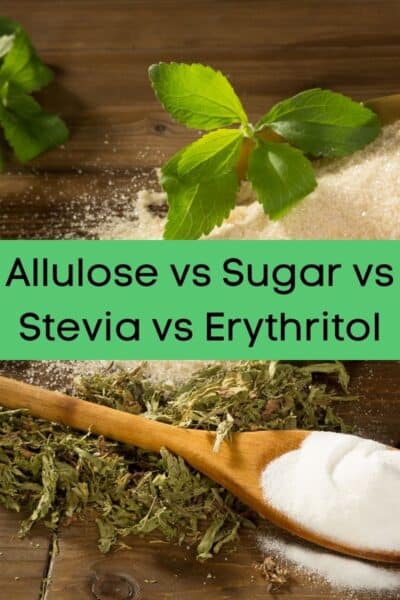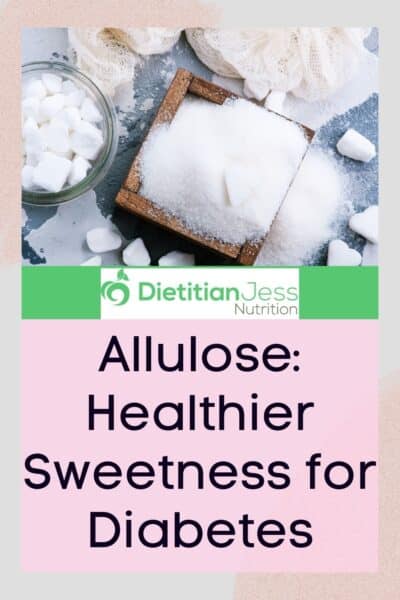Allulose as a sugar substitute in Diabetes Management: Unveiling a Healthier Sweetness
Allulose has been gaining popularity in recent years as a sugar substitute. For diabetics, it’s important to understand its effects on blood sugar and how it can be a part of a healthy diabetes diet.
What is Allulose Sweetener?
Allulose is a low-calorie sweetener with significantly fewer calories and two-thirds the sweetness of sucrose (regular table sugar). It provides just 0.2 to 0.4 calories per gram, which is significantly lower than the 4 calories per gram found in regular sugar, making it beneficial for diabetics.
What is Allulose made from?
Allulose falls under the umbrella of rare sugars, which occur in limited quantities in nature. Allulose is made by starting with starch extracted from corn. Through a series of controlled enzymatic reactions, the starch is broken down and transformed into allulose and can be easily mass-produced.
How is Allulose No Calories?
This sugar substitute is ingested and absorbed in the small intestine (with some fermentation) and approximately 70% will enter the bloodstream. Allulose is not metabolized in the human body but can be found in the urine. The remaining 30% heads to the large intestine, where it doesn’t undergo fermentation but rather exits the body.
Does Allulose Raise Blood Sugar?
Studies indicate that allulose has antihyperglycemic properties- in other words- when consumed with other types of sugars it helps curb blood sugar spikes and by itself does not affect blood sugar levels.
Alternative sweeteners have been studied closely and with allulose, we can conclude a favorable impact on glycemic control but also the effect on the hormone ghrelin, the hormone that controls hunger. Research shows that allulose exhibits a clinically favorable safety profile concerning blood lipids, uric acid and systemic inflammation, making it a safe sugar alternative.
Is Allulose Safe?
The safety of allulose has been evaluated by the FDA through its Generally Recognized as Safe (GRAS) process. This designation signifies that, based on the available scientific evidence, allulose is considered safe for its intended use as a sweetener in various food and beverage products.
While allulose is generally safe, individuals may still experience minor digestive discomfort, as with any food ingredient. Research indicates that it is unlikely to cause common side effects associated with some sugar alcohols, including abdominal pain, bloating, and diarrhea.
FDA issued final guidance on allulose stating that manufacturers to use 0.4 calories per gram of allulose when calculating the calories from allulose in a serving of a product. However, manufacturers must continue to include allulose in the Total Carbohydrate and Calories on food labels but do not have to account for the grams of Total Sugars and/or Added Sugars.
Allulose: a Sugar Substitute in a Diabetic Diet
From desserts to savory dishes, the options are endless for utilizing allulose in recipes. We know that limiting sugar intake is especially important for a diabetic diet so using allulose in multiple ways can be beneficial for blood sugars. It’s a great substitute for regular when it comes to baked goods, it browns like sugar and helps create that beautiful caramelization, making it perfect for cookies, muffins, and cakes. (You can also use in your coffee!)
In savory dishes, allulose’s mild sweetness can balance out acidic or spicy flavors. Its ability to reduce crystallization makes it easy to use in syrups, sauces, and salad dressings. Whether you’re whipping up a barbecue glaze or a vinaigrette, allulose can add that hint of sweetness to your dish.
Other Healthy Sugar Substitutes
Allulose vs Erythritol
Erythritol is a sugar alcohol, a type of sweetener found naturally in small amounts in fruits like pears, watermelons, and grapes, but it’s typically produced commercially from glucose via fermentation. Similar to allulose it is low on the glycemic index, having little affect on blood sugars and does not contribute calories. Erythritol doesn’t work as well as other sugars substitutes because it does not have the browning/carmelization effect.
Allulose vs Stevia
Stevia is sweetener derived from the leaves of the Stevia rebaudiana plant. It contains naturally occurring compounds called steviol glycosides that give it its sweet taste. Like allulose it non-caloric and has minimal to no impact on blood sugars. It is much sweeter than regular sugar so you can use less of it but it’s also known to have a bitter aftertaste for some people.
In summary, both allulose and stevia are good sugar alternatives, but they have distinct characteristics. Allulose is closer to sugar in taste and texture and is suitable for baking, while stevia is calorie-free and might be a better choice for those who want to avoid any impact on blood sugar.
Tips for Using Allulose in Baking, Cooking, and Beverages
Cooking and baking with Allulose might seem challenging at first, but it doesn’t have to be.Here are some valuable tips on how to utilize allulose in recipes to make the most of this versatile sweetener:
- Introduce Slowly: If you’re new to allulose, start by replacing a portion of the sugar in your recipes and gradually increase the allulose content as you become more familiar with its effects on taste and texture.
- Ingredient Adjustments: Allulose doesn’t have the same level of moisture that sugar does so other ingredients, like flour or liquid, may need to be adjusted.
- Be Careful with Browning: Allulose can brown quickly due to its heat-resistant properties.
- Store Correctly: Allulose has a tendency to absorb moisture from the air, which can cause it to harden.
Trends and Products
Sugar reduction continues to be a trend in the food industry due to an increased interest in wellness and the prevention of disease. Diets such as the keto have expanded possibilities of using sugar substitutes like allulose. Desserts can also be made more diabetes friendly in other ways as discussed in a previous post.
Plus allulose has a distinct advantage: a low glycemic index, meaning it doesn’t elevate blood sugar levels after eating. Allulose is used in pharmaceuticals as a gelling agent in medicines and drugs. It’s also being increasingly seen used in packaged as soups, sauces, sauerkraut, toppings, pickles, salads, soft drinks, and more.
While there are many different brands of allulose, make sure the only ingredient is allulose! From my research this appears to be a well reviewed and wholesome option for purchasing allulose (affiliate link).
Conclusion:
I’m one to always advocate for trying something new and I’m in agreement that sugar should be reduced in most American diets so why not give allulose a try?! I would love to hear if you’ve tried allulose and what your thoughts were on this alternative sweetener.
If you’re looking for more diabetes support make sure you check out my resources and services!







